Organizational Behavior at the BBC: Motivation and Team Dynamics
VerifiedAdded on 2020/09/17
|14
|4177
|73
Report
AI Summary
This report provides a comprehensive analysis of organizational behavior within the BBC, examining its historical power culture and its impact on employee behavior. The report explores how culture, power, and politics have influenced the BBC, and it delves into motivation theories, including content and process theories, to assess their impact on team effectiveness. It also identifies different types of teams within the BBC, analyzes team development using Tuckman's model, and suggests strategies for improving team performance and productivity. The report also addresses barriers to effective performance within the BBC and concludes with recommendations for fostering a more motivated and productive work environment. The report also provides insights into how the BBC's goals can be achieved through improved employee motivation and effective team management.
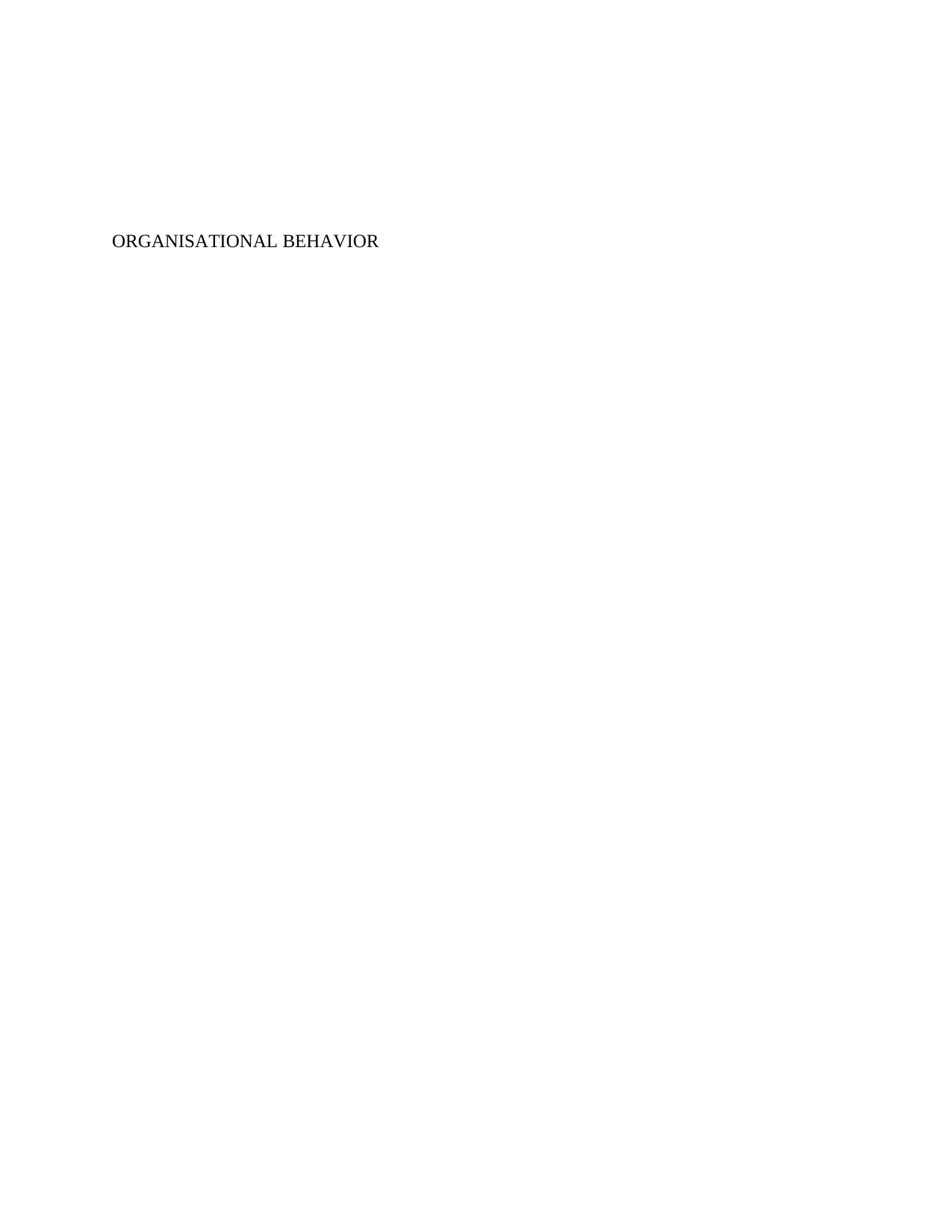
ORGANISATIONAL BEHAVIOR
Paraphrase This Document
Need a fresh take? Get an instant paraphrase of this document with our AI Paraphraser
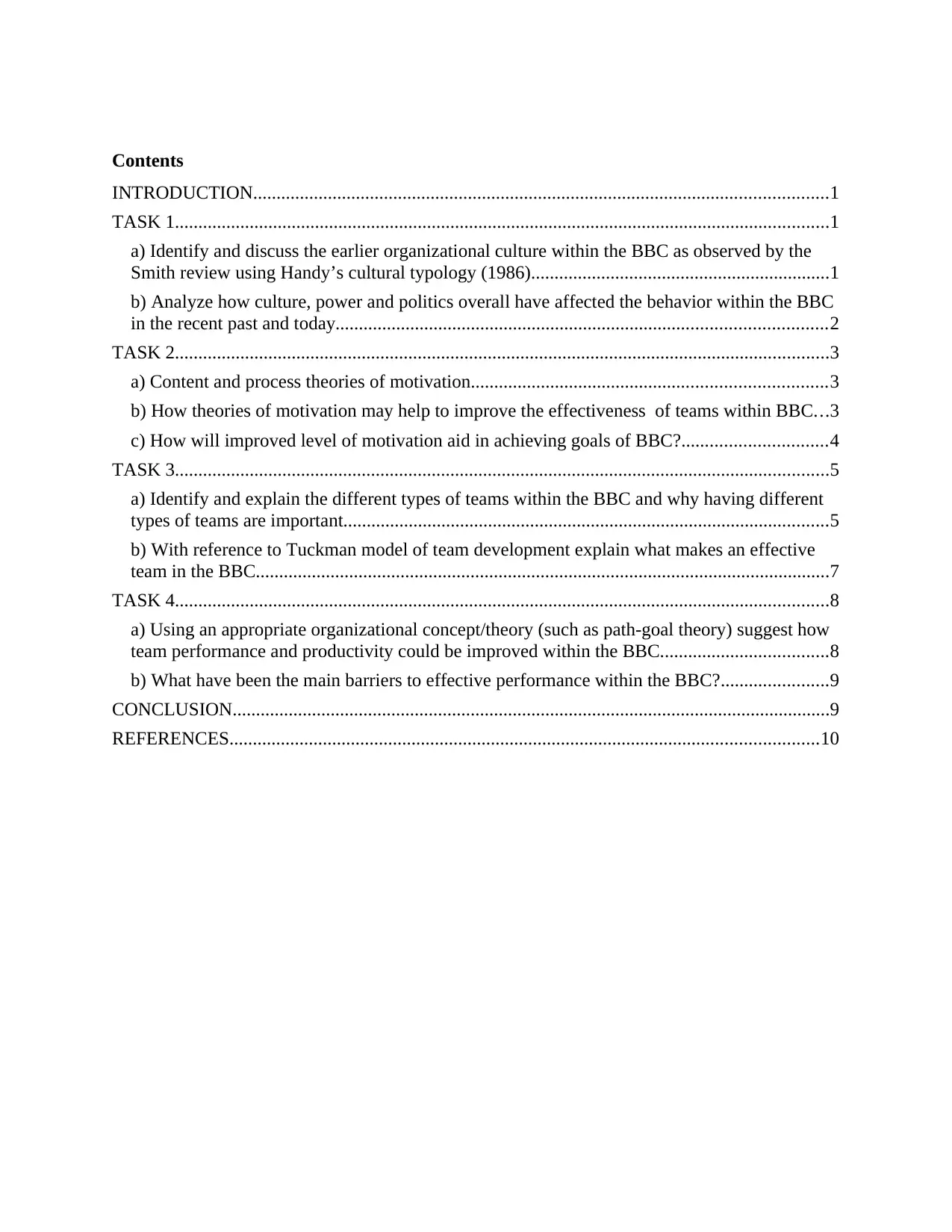
Contents
INTRODUCTION...........................................................................................................................1
TASK 1............................................................................................................................................1
a) Identify and discuss the earlier organizational culture within the BBC as observed by the
Smith review using Handy’s cultural typology (1986)................................................................1
b) Analyze how culture, power and politics overall have affected the behavior within the BBC
in the recent past and today.........................................................................................................2
TASK 2............................................................................................................................................3
a) Content and process theories of motivation............................................................................3
b) How theories of motivation may help to improve the effectiveness of teams within BBC...3
c) How will improved level of motivation aid in achieving goals of BBC?...............................4
TASK 3............................................................................................................................................5
a) Identify and explain the different types of teams within the BBC and why having different
types of teams are important........................................................................................................5
b) With reference to Tuckman model of team development explain what makes an effective
team in the BBC...........................................................................................................................7
TASK 4............................................................................................................................................8
a) Using an appropriate organizational concept/theory (such as path-goal theory) suggest how
team performance and productivity could be improved within the BBC....................................8
b) What have been the main barriers to effective performance within the BBC?.......................9
CONCLUSION................................................................................................................................9
REFERENCES..............................................................................................................................10
INTRODUCTION...........................................................................................................................1
TASK 1............................................................................................................................................1
a) Identify and discuss the earlier organizational culture within the BBC as observed by the
Smith review using Handy’s cultural typology (1986)................................................................1
b) Analyze how culture, power and politics overall have affected the behavior within the BBC
in the recent past and today.........................................................................................................2
TASK 2............................................................................................................................................3
a) Content and process theories of motivation............................................................................3
b) How theories of motivation may help to improve the effectiveness of teams within BBC...3
c) How will improved level of motivation aid in achieving goals of BBC?...............................4
TASK 3............................................................................................................................................5
a) Identify and explain the different types of teams within the BBC and why having different
types of teams are important........................................................................................................5
b) With reference to Tuckman model of team development explain what makes an effective
team in the BBC...........................................................................................................................7
TASK 4............................................................................................................................................8
a) Using an appropriate organizational concept/theory (such as path-goal theory) suggest how
team performance and productivity could be improved within the BBC....................................8
b) What have been the main barriers to effective performance within the BBC?.......................9
CONCLUSION................................................................................................................................9
REFERENCES..............................................................................................................................10
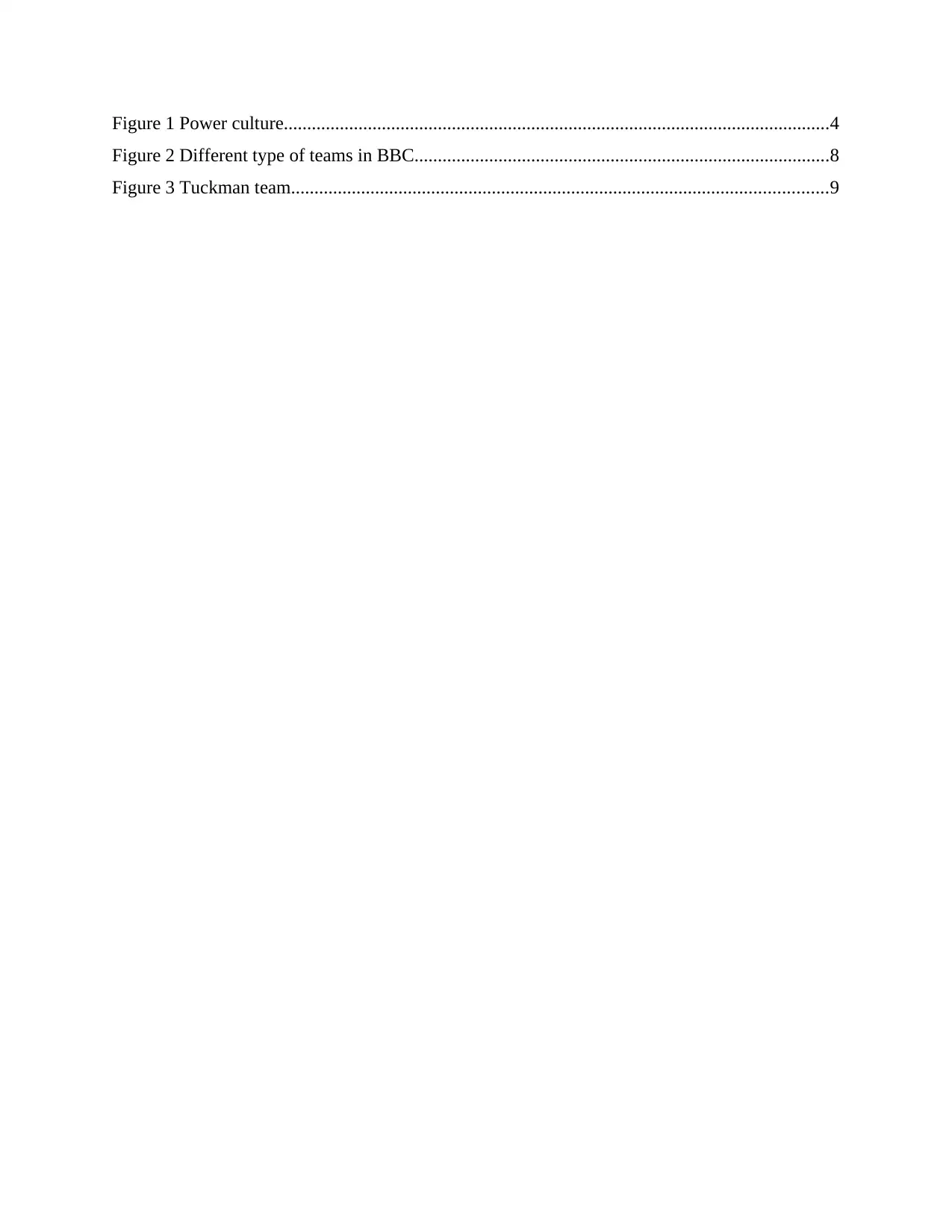
Figure 1 Power culture.....................................................................................................................4
Figure 2 Different type of teams in BBC.........................................................................................8
Figure 3 Tuckman team...................................................................................................................9
Figure 2 Different type of teams in BBC.........................................................................................8
Figure 3 Tuckman team...................................................................................................................9
⊘ This is a preview!⊘
Do you want full access?
Subscribe today to unlock all pages.

Trusted by 1+ million students worldwide
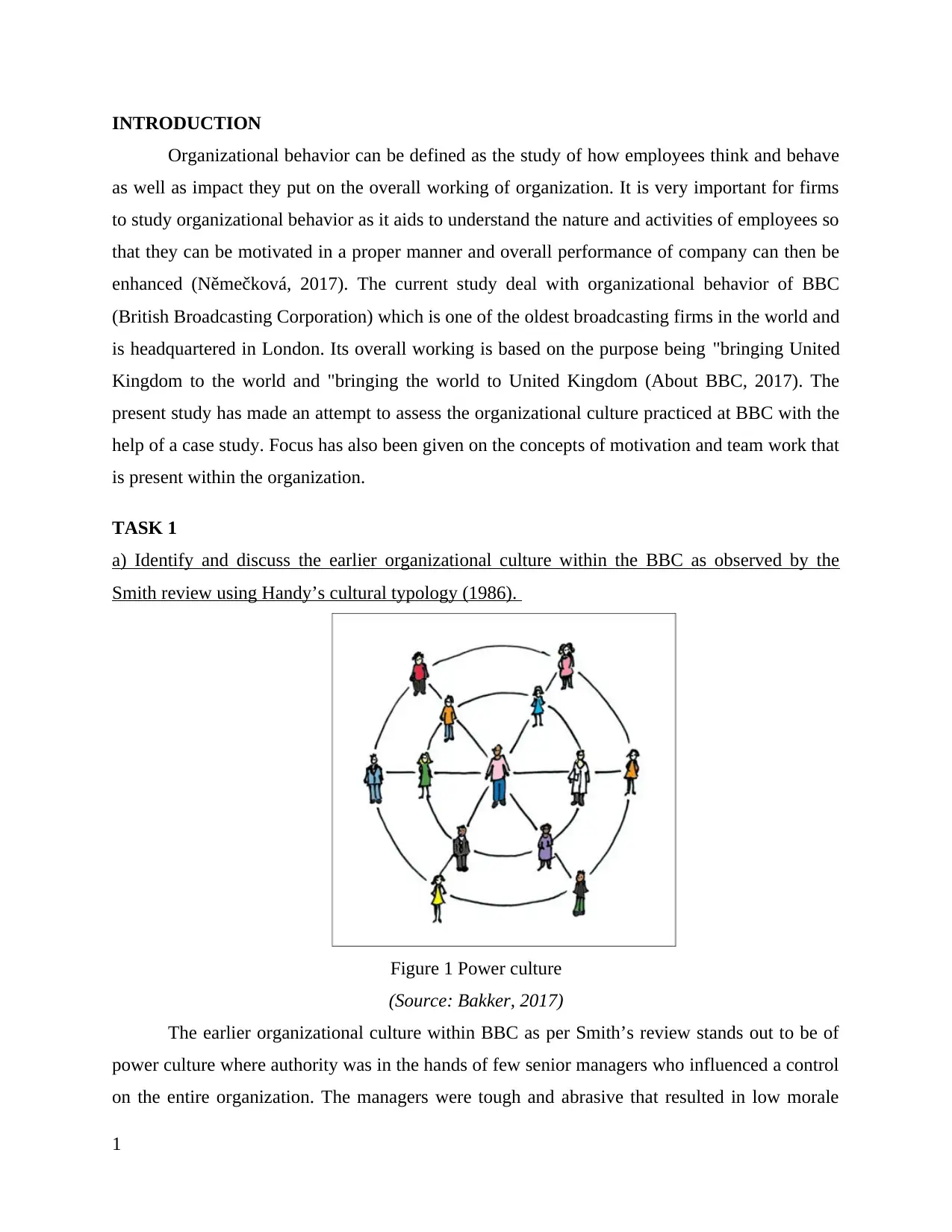
INTRODUCTION
Organizational behavior can be defined as the study of how employees think and behave
as well as impact they put on the overall working of organization. It is very important for firms
to study organizational behavior as it aids to understand the nature and activities of employees so
that they can be motivated in a proper manner and overall performance of company can then be
enhanced (Němečková, 2017). The current study deal with organizational behavior of BBC
(British Broadcasting Corporation) which is one of the oldest broadcasting firms in the world and
is headquartered in London. Its overall working is based on the purpose being "bringing United
Kingdom to the world and "bringing the world to United Kingdom (About BBC, 2017). The
present study has made an attempt to assess the organizational culture practiced at BBC with the
help of a case study. Focus has also been given on the concepts of motivation and team work that
is present within the organization.
TASK 1
a) Identify and discuss the earlier organizational culture within the BBC as observed by the
Smith review using Handy’s cultural typology (1986).
Figure 1 Power culture
(Source: Bakker, 2017)
The earlier organizational culture within BBC as per Smith’s review stands out to be of
power culture where authority was in the hands of few senior managers who influenced a control
on the entire organization. The managers were tough and abrasive that resulted in low morale
1
Organizational behavior can be defined as the study of how employees think and behave
as well as impact they put on the overall working of organization. It is very important for firms
to study organizational behavior as it aids to understand the nature and activities of employees so
that they can be motivated in a proper manner and overall performance of company can then be
enhanced (Němečková, 2017). The current study deal with organizational behavior of BBC
(British Broadcasting Corporation) which is one of the oldest broadcasting firms in the world and
is headquartered in London. Its overall working is based on the purpose being "bringing United
Kingdom to the world and "bringing the world to United Kingdom (About BBC, 2017). The
present study has made an attempt to assess the organizational culture practiced at BBC with the
help of a case study. Focus has also been given on the concepts of motivation and team work that
is present within the organization.
TASK 1
a) Identify and discuss the earlier organizational culture within the BBC as observed by the
Smith review using Handy’s cultural typology (1986).
Figure 1 Power culture
(Source: Bakker, 2017)
The earlier organizational culture within BBC as per Smith’s review stands out to be of
power culture where authority was in the hands of few senior managers who influenced a control
on the entire organization. The managers were tough and abrasive that resulted in low morale
1
Paraphrase This Document
Need a fresh take? Get an instant paraphrase of this document with our AI Paraphraser
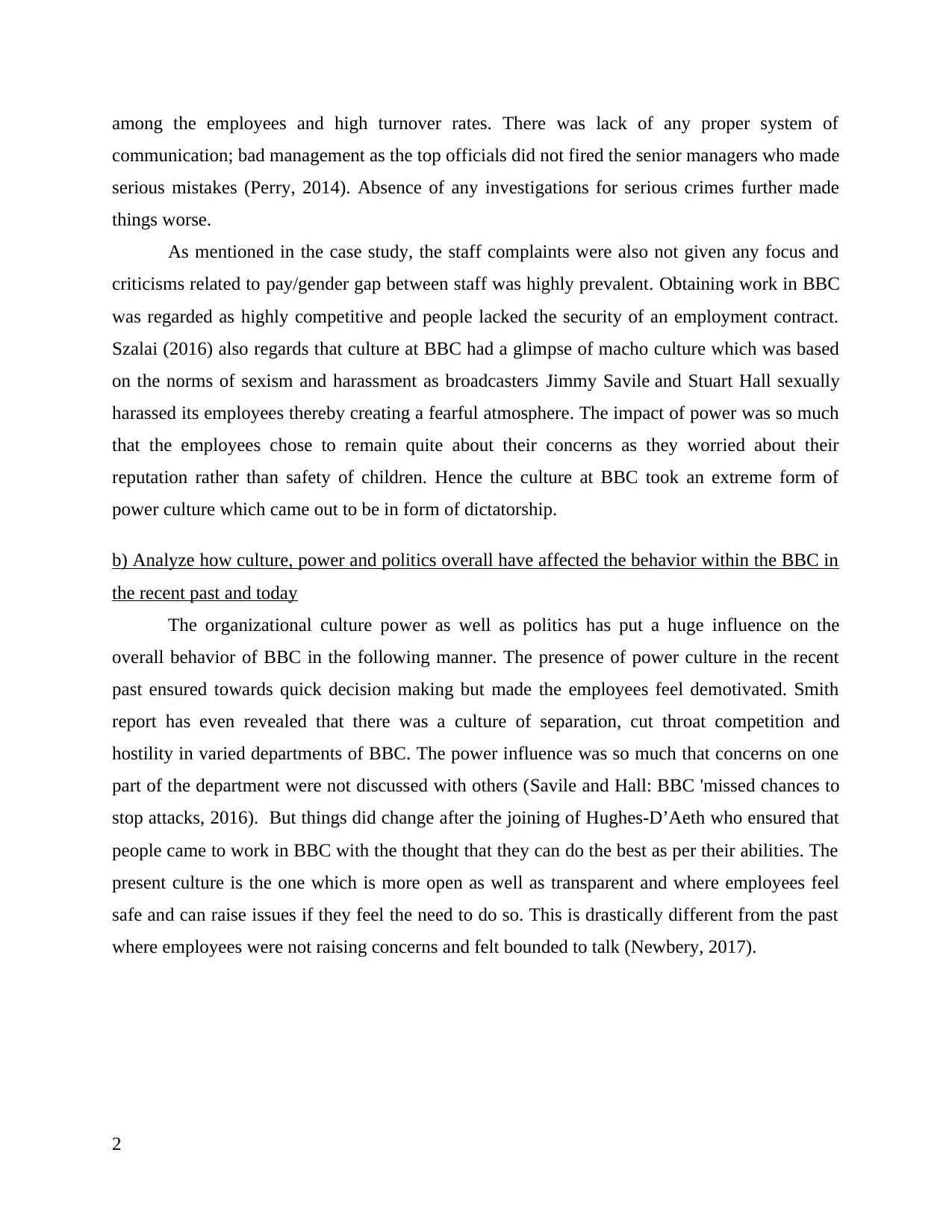
among the employees and high turnover rates. There was lack of any proper system of
communication; bad management as the top officials did not fired the senior managers who made
serious mistakes (Perry, 2014). Absence of any investigations for serious crimes further made
things worse.
As mentioned in the case study, the staff complaints were also not given any focus and
criticisms related to pay/gender gap between staff was highly prevalent. Obtaining work in BBC
was regarded as highly competitive and people lacked the security of an employment contract.
Szalai (2016) also regards that culture at BBC had a glimpse of macho culture which was based
on the norms of sexism and harassment as broadcasters Jimmy Savile and Stuart Hall sexually
harassed its employees thereby creating a fearful atmosphere. The impact of power was so much
that the employees chose to remain quite about their concerns as they worried about their
reputation rather than safety of children. Hence the culture at BBC took an extreme form of
power culture which came out to be in form of dictatorship.
b) Analyze how culture, power and politics overall have affected the behavior within the BBC in
the recent past and today
The organizational culture power as well as politics has put a huge influence on the
overall behavior of BBC in the following manner. The presence of power culture in the recent
past ensured towards quick decision making but made the employees feel demotivated. Smith
report has even revealed that there was a culture of separation, cut throat competition and
hostility in varied departments of BBC. The power influence was so much that concerns on one
part of the department were not discussed with others (Savile and Hall: BBC 'missed chances to
stop attacks, 2016). But things did change after the joining of Hughes-D’Aeth who ensured that
people came to work in BBC with the thought that they can do the best as per their abilities. The
present culture is the one which is more open as well as transparent and where employees feel
safe and can raise issues if they feel the need to do so. This is drastically different from the past
where employees were not raising concerns and felt bounded to talk (Newbery, 2017).
2
communication; bad management as the top officials did not fired the senior managers who made
serious mistakes (Perry, 2014). Absence of any investigations for serious crimes further made
things worse.
As mentioned in the case study, the staff complaints were also not given any focus and
criticisms related to pay/gender gap between staff was highly prevalent. Obtaining work in BBC
was regarded as highly competitive and people lacked the security of an employment contract.
Szalai (2016) also regards that culture at BBC had a glimpse of macho culture which was based
on the norms of sexism and harassment as broadcasters Jimmy Savile and Stuart Hall sexually
harassed its employees thereby creating a fearful atmosphere. The impact of power was so much
that the employees chose to remain quite about their concerns as they worried about their
reputation rather than safety of children. Hence the culture at BBC took an extreme form of
power culture which came out to be in form of dictatorship.
b) Analyze how culture, power and politics overall have affected the behavior within the BBC in
the recent past and today
The organizational culture power as well as politics has put a huge influence on the
overall behavior of BBC in the following manner. The presence of power culture in the recent
past ensured towards quick decision making but made the employees feel demotivated. Smith
report has even revealed that there was a culture of separation, cut throat competition and
hostility in varied departments of BBC. The power influence was so much that concerns on one
part of the department were not discussed with others (Savile and Hall: BBC 'missed chances to
stop attacks, 2016). But things did change after the joining of Hughes-D’Aeth who ensured that
people came to work in BBC with the thought that they can do the best as per their abilities. The
present culture is the one which is more open as well as transparent and where employees feel
safe and can raise issues if they feel the need to do so. This is drastically different from the past
where employees were not raising concerns and felt bounded to talk (Newbery, 2017).
2
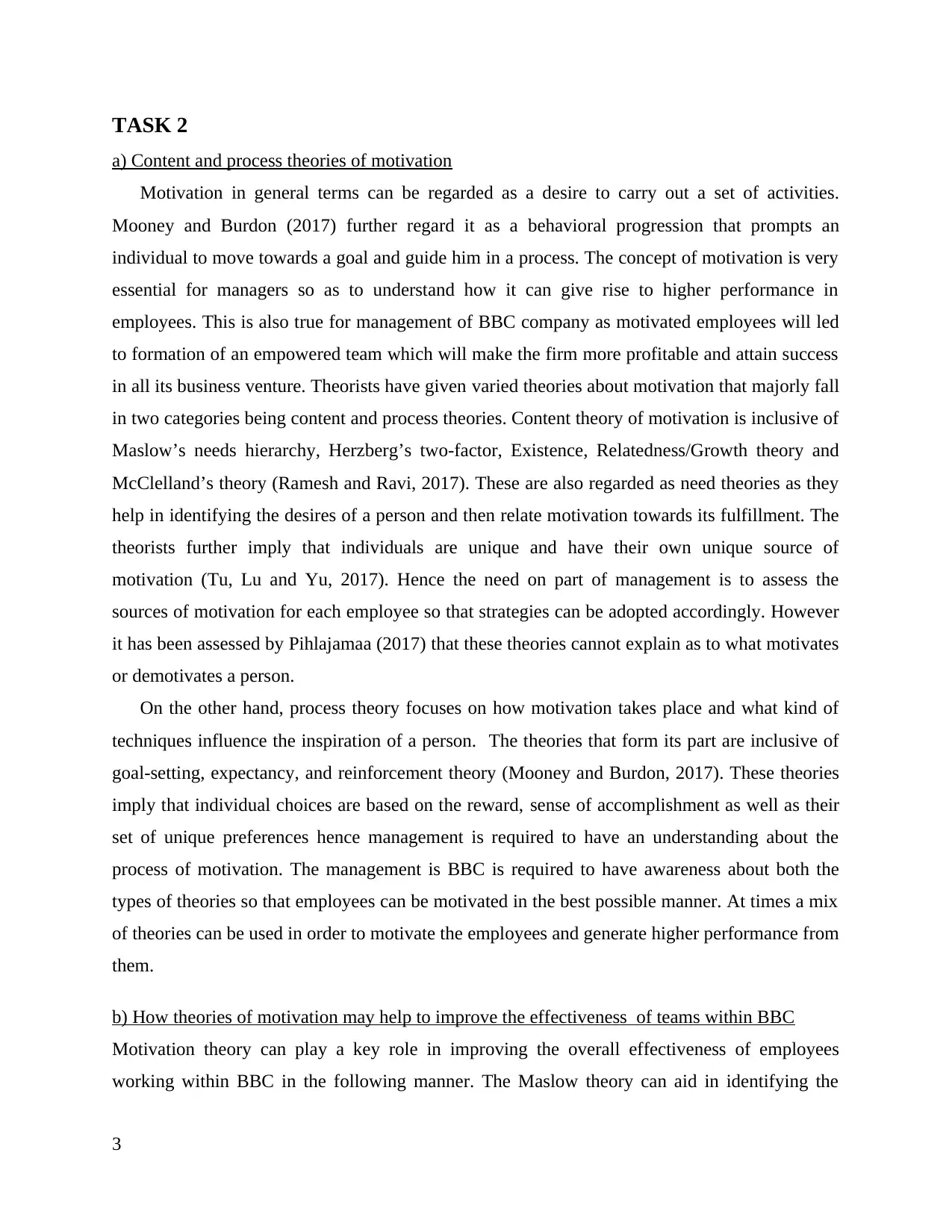
TASK 2
a) Content and process theories of motivation
Motivation in general terms can be regarded as a desire to carry out a set of activities.
Mooney and Burdon (2017) further regard it as a behavioral progression that prompts an
individual to move towards a goal and guide him in a process. The concept of motivation is very
essential for managers so as to understand how it can give rise to higher performance in
employees. This is also true for management of BBC company as motivated employees will led
to formation of an empowered team which will make the firm more profitable and attain success
in all its business venture. Theorists have given varied theories about motivation that majorly fall
in two categories being content and process theories. Content theory of motivation is inclusive of
Maslow’s needs hierarchy, Herzberg’s two-factor, Existence, Relatedness/Growth theory and
McClelland’s theory (Ramesh and Ravi, 2017). These are also regarded as need theories as they
help in identifying the desires of a person and then relate motivation towards its fulfillment. The
theorists further imply that individuals are unique and have their own unique source of
motivation (Tu, Lu and Yu, 2017). Hence the need on part of management is to assess the
sources of motivation for each employee so that strategies can be adopted accordingly. However
it has been assessed by Pihlajamaa (2017) that these theories cannot explain as to what motivates
or demotivates a person.
On the other hand, process theory focuses on how motivation takes place and what kind of
techniques influence the inspiration of a person. The theories that form its part are inclusive of
goal-setting, expectancy, and reinforcement theory (Mooney and Burdon, 2017). These theories
imply that individual choices are based on the reward, sense of accomplishment as well as their
set of unique preferences hence management is required to have an understanding about the
process of motivation. The management is BBC is required to have awareness about both the
types of theories so that employees can be motivated in the best possible manner. At times a mix
of theories can be used in order to motivate the employees and generate higher performance from
them.
b) How theories of motivation may help to improve the effectiveness of teams within BBC
Motivation theory can play a key role in improving the overall effectiveness of employees
working within BBC in the following manner. The Maslow theory can aid in identifying the
3
a) Content and process theories of motivation
Motivation in general terms can be regarded as a desire to carry out a set of activities.
Mooney and Burdon (2017) further regard it as a behavioral progression that prompts an
individual to move towards a goal and guide him in a process. The concept of motivation is very
essential for managers so as to understand how it can give rise to higher performance in
employees. This is also true for management of BBC company as motivated employees will led
to formation of an empowered team which will make the firm more profitable and attain success
in all its business venture. Theorists have given varied theories about motivation that majorly fall
in two categories being content and process theories. Content theory of motivation is inclusive of
Maslow’s needs hierarchy, Herzberg’s two-factor, Existence, Relatedness/Growth theory and
McClelland’s theory (Ramesh and Ravi, 2017). These are also regarded as need theories as they
help in identifying the desires of a person and then relate motivation towards its fulfillment. The
theorists further imply that individuals are unique and have their own unique source of
motivation (Tu, Lu and Yu, 2017). Hence the need on part of management is to assess the
sources of motivation for each employee so that strategies can be adopted accordingly. However
it has been assessed by Pihlajamaa (2017) that these theories cannot explain as to what motivates
or demotivates a person.
On the other hand, process theory focuses on how motivation takes place and what kind of
techniques influence the inspiration of a person. The theories that form its part are inclusive of
goal-setting, expectancy, and reinforcement theory (Mooney and Burdon, 2017). These theories
imply that individual choices are based on the reward, sense of accomplishment as well as their
set of unique preferences hence management is required to have an understanding about the
process of motivation. The management is BBC is required to have awareness about both the
types of theories so that employees can be motivated in the best possible manner. At times a mix
of theories can be used in order to motivate the employees and generate higher performance from
them.
b) How theories of motivation may help to improve the effectiveness of teams within BBC
Motivation theory can play a key role in improving the overall effectiveness of employees
working within BBC in the following manner. The Maslow theory can aid in identifying the
3
⊘ This is a preview!⊘
Do you want full access?
Subscribe today to unlock all pages.

Trusted by 1+ million students worldwide
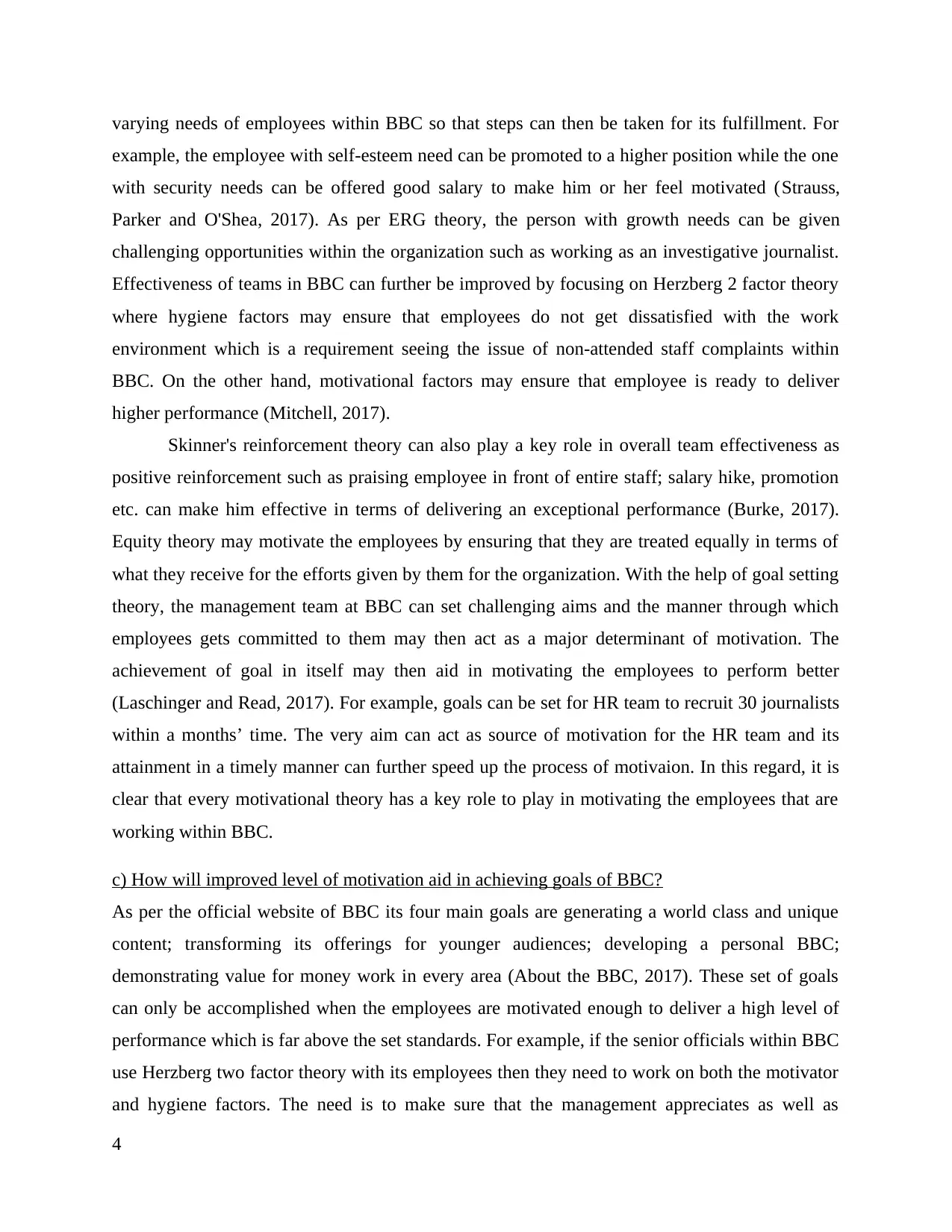
varying needs of employees within BBC so that steps can then be taken for its fulfillment. For
example, the employee with self-esteem need can be promoted to a higher position while the one
with security needs can be offered good salary to make him or her feel motivated (Strauss,
Parker and O'Shea, 2017). As per ERG theory, the person with growth needs can be given
challenging opportunities within the organization such as working as an investigative journalist.
Effectiveness of teams in BBC can further be improved by focusing on Herzberg 2 factor theory
where hygiene factors may ensure that employees do not get dissatisfied with the work
environment which is a requirement seeing the issue of non-attended staff complaints within
BBC. On the other hand, motivational factors may ensure that employee is ready to deliver
higher performance (Mitchell, 2017).
Skinner's reinforcement theory can also play a key role in overall team effectiveness as
positive reinforcement such as praising employee in front of entire staff; salary hike, promotion
etc. can make him effective in terms of delivering an exceptional performance (Burke, 2017).
Equity theory may motivate the employees by ensuring that they are treated equally in terms of
what they receive for the efforts given by them for the organization. With the help of goal setting
theory, the management team at BBC can set challenging aims and the manner through which
employees gets committed to them may then act as a major determinant of motivation. The
achievement of goal in itself may then aid in motivating the employees to perform better
(Laschinger and Read, 2017). For example, goals can be set for HR team to recruit 30 journalists
within a months’ time. The very aim can act as source of motivation for the HR team and its
attainment in a timely manner can further speed up the process of motivaion. In this regard, it is
clear that every motivational theory has a key role to play in motivating the employees that are
working within BBC.
c) How will improved level of motivation aid in achieving goals of BBC?
As per the official website of BBC its four main goals are generating a world class and unique
content; transforming its offerings for younger audiences; developing a personal BBC;
demonstrating value for money work in every area (About the BBC, 2017). These set of goals
can only be accomplished when the employees are motivated enough to deliver a high level of
performance which is far above the set standards. For example, if the senior officials within BBC
use Herzberg two factor theory with its employees then they need to work on both the motivator
and hygiene factors. The need is to make sure that the management appreciates as well as
4
example, the employee with self-esteem need can be promoted to a higher position while the one
with security needs can be offered good salary to make him or her feel motivated (Strauss,
Parker and O'Shea, 2017). As per ERG theory, the person with growth needs can be given
challenging opportunities within the organization such as working as an investigative journalist.
Effectiveness of teams in BBC can further be improved by focusing on Herzberg 2 factor theory
where hygiene factors may ensure that employees do not get dissatisfied with the work
environment which is a requirement seeing the issue of non-attended staff complaints within
BBC. On the other hand, motivational factors may ensure that employee is ready to deliver
higher performance (Mitchell, 2017).
Skinner's reinforcement theory can also play a key role in overall team effectiveness as
positive reinforcement such as praising employee in front of entire staff; salary hike, promotion
etc. can make him effective in terms of delivering an exceptional performance (Burke, 2017).
Equity theory may motivate the employees by ensuring that they are treated equally in terms of
what they receive for the efforts given by them for the organization. With the help of goal setting
theory, the management team at BBC can set challenging aims and the manner through which
employees gets committed to them may then act as a major determinant of motivation. The
achievement of goal in itself may then aid in motivating the employees to perform better
(Laschinger and Read, 2017). For example, goals can be set for HR team to recruit 30 journalists
within a months’ time. The very aim can act as source of motivation for the HR team and its
attainment in a timely manner can further speed up the process of motivaion. In this regard, it is
clear that every motivational theory has a key role to play in motivating the employees that are
working within BBC.
c) How will improved level of motivation aid in achieving goals of BBC?
As per the official website of BBC its four main goals are generating a world class and unique
content; transforming its offerings for younger audiences; developing a personal BBC;
demonstrating value for money work in every area (About the BBC, 2017). These set of goals
can only be accomplished when the employees are motivated enough to deliver a high level of
performance which is far above the set standards. For example, if the senior officials within BBC
use Herzberg two factor theory with its employees then they need to work on both the motivator
and hygiene factors. The need is to make sure that the management appreciates as well as
4
Paraphrase This Document
Need a fresh take? Get an instant paraphrase of this document with our AI Paraphraser
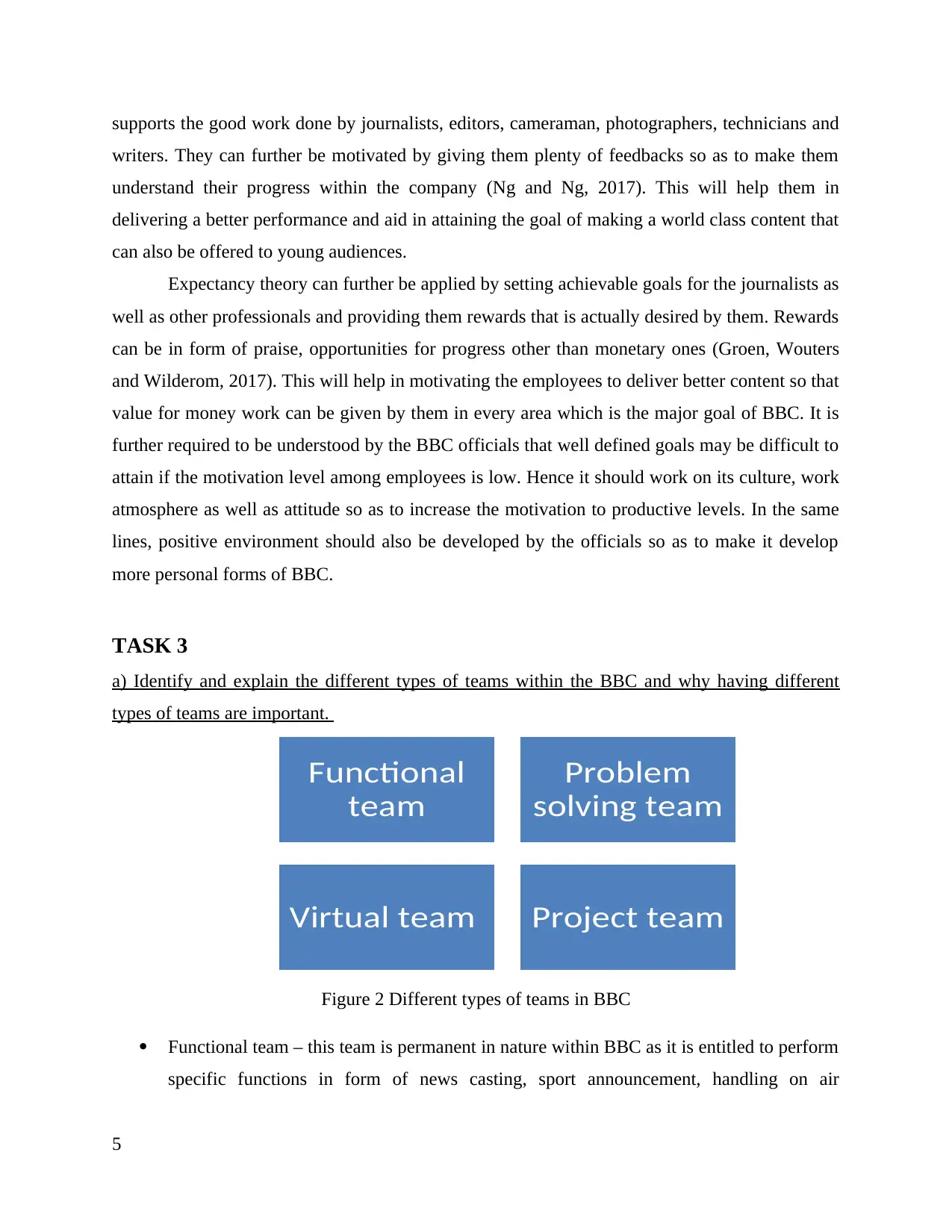
supports the good work done by journalists, editors, cameraman, photographers, technicians and
writers. They can further be motivated by giving them plenty of feedbacks so as to make them
understand their progress within the company (Ng and Ng, 2017). This will help them in
delivering a better performance and aid in attaining the goal of making a world class content that
can also be offered to young audiences.
Expectancy theory can further be applied by setting achievable goals for the journalists as
well as other professionals and providing them rewards that is actually desired by them. Rewards
can be in form of praise, opportunities for progress other than monetary ones (Groen, Wouters
and Wilderom, 2017). This will help in motivating the employees to deliver better content so that
value for money work can be given by them in every area which is the major goal of BBC. It is
further required to be understood by the BBC officials that well defined goals may be difficult to
attain if the motivation level among employees is low. Hence it should work on its culture, work
atmosphere as well as attitude so as to increase the motivation to productive levels. In the same
lines, positive environment should also be developed by the officials so as to make it develop
more personal forms of BBC.
TASK 3
a) Identify and explain the different types of teams within the BBC and why having different
types of teams are important.
Figure 2 Different types of teams in BBC
Functional team – this team is permanent in nature within BBC as it is entitled to perform
specific functions in form of news casting, sport announcement, handling on air
5
Functional
team
Problem
solving team
Virtual team Project team
writers. They can further be motivated by giving them plenty of feedbacks so as to make them
understand their progress within the company (Ng and Ng, 2017). This will help them in
delivering a better performance and aid in attaining the goal of making a world class content that
can also be offered to young audiences.
Expectancy theory can further be applied by setting achievable goals for the journalists as
well as other professionals and providing them rewards that is actually desired by them. Rewards
can be in form of praise, opportunities for progress other than monetary ones (Groen, Wouters
and Wilderom, 2017). This will help in motivating the employees to deliver better content so that
value for money work can be given by them in every area which is the major goal of BBC. It is
further required to be understood by the BBC officials that well defined goals may be difficult to
attain if the motivation level among employees is low. Hence it should work on its culture, work
atmosphere as well as attitude so as to increase the motivation to productive levels. In the same
lines, positive environment should also be developed by the officials so as to make it develop
more personal forms of BBC.
TASK 3
a) Identify and explain the different types of teams within the BBC and why having different
types of teams are important.
Figure 2 Different types of teams in BBC
Functional team – this team is permanent in nature within BBC as it is entitled to perform
specific functions in form of news casting, sport announcement, handling on air
5
Functional
team
Problem
solving team
Virtual team Project team
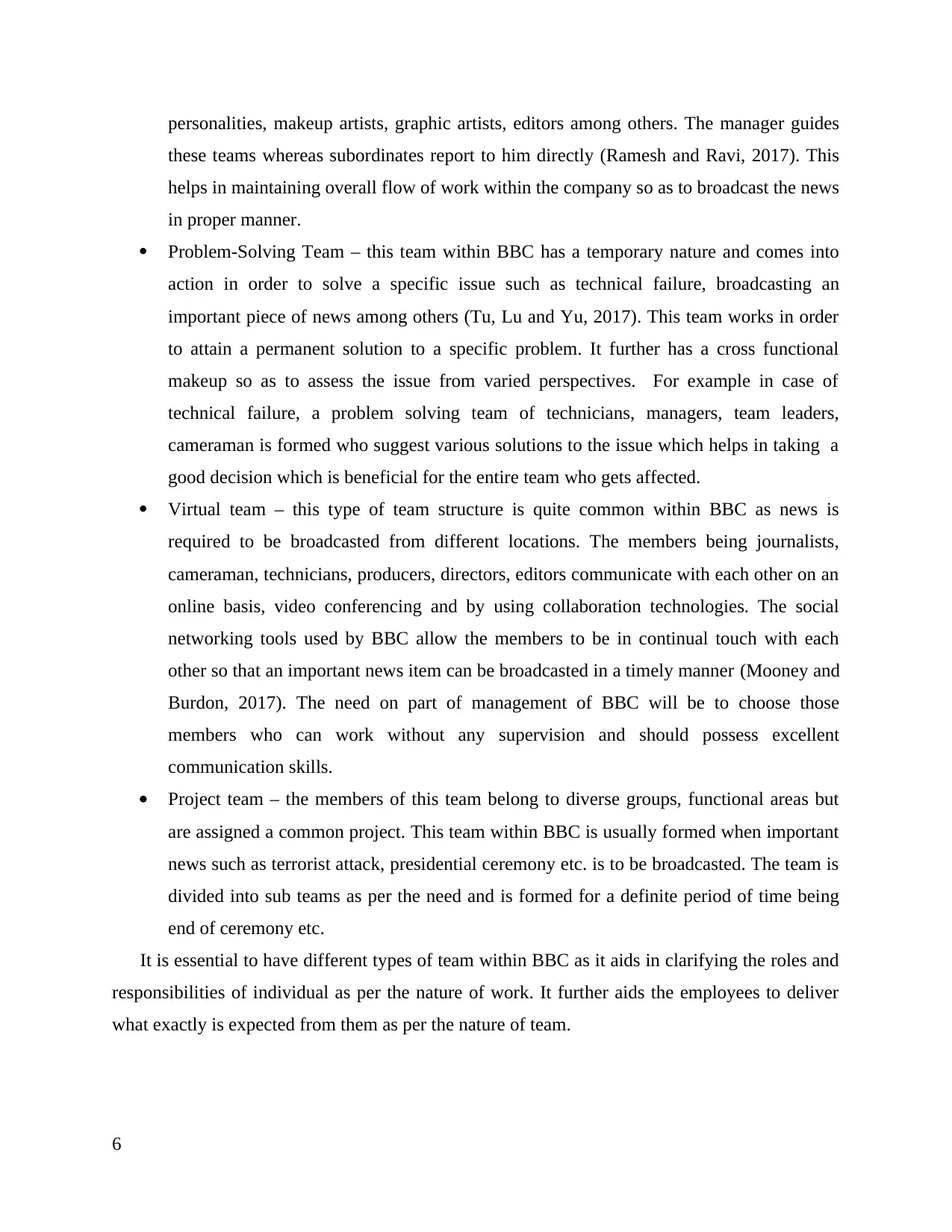
personalities, makeup artists, graphic artists, editors among others. The manager guides
these teams whereas subordinates report to him directly (Ramesh and Ravi, 2017). This
helps in maintaining overall flow of work within the company so as to broadcast the news
in proper manner.
Problem-Solving Team – this team within BBC has a temporary nature and comes into
action in order to solve a specific issue such as technical failure, broadcasting an
important piece of news among others (Tu, Lu and Yu, 2017). This team works in order
to attain a permanent solution to a specific problem. It further has a cross functional
makeup so as to assess the issue from varied perspectives. For example in case of
technical failure, a problem solving team of technicians, managers, team leaders,
cameraman is formed who suggest various solutions to the issue which helps in taking a
good decision which is beneficial for the entire team who gets affected.
Virtual team – this type of team structure is quite common within BBC as news is
required to be broadcasted from different locations. The members being journalists,
cameraman, technicians, producers, directors, editors communicate with each other on an
online basis, video conferencing and by using collaboration technologies. The social
networking tools used by BBC allow the members to be in continual touch with each
other so that an important news item can be broadcasted in a timely manner (Mooney and
Burdon, 2017). The need on part of management of BBC will be to choose those
members who can work without any supervision and should possess excellent
communication skills.
Project team – the members of this team belong to diverse groups, functional areas but
are assigned a common project. This team within BBC is usually formed when important
news such as terrorist attack, presidential ceremony etc. is to be broadcasted. The team is
divided into sub teams as per the need and is formed for a definite period of time being
end of ceremony etc.
It is essential to have different types of team within BBC as it aids in clarifying the roles and
responsibilities of individual as per the nature of work. It further aids the employees to deliver
what exactly is expected from them as per the nature of team.
6
these teams whereas subordinates report to him directly (Ramesh and Ravi, 2017). This
helps in maintaining overall flow of work within the company so as to broadcast the news
in proper manner.
Problem-Solving Team – this team within BBC has a temporary nature and comes into
action in order to solve a specific issue such as technical failure, broadcasting an
important piece of news among others (Tu, Lu and Yu, 2017). This team works in order
to attain a permanent solution to a specific problem. It further has a cross functional
makeup so as to assess the issue from varied perspectives. For example in case of
technical failure, a problem solving team of technicians, managers, team leaders,
cameraman is formed who suggest various solutions to the issue which helps in taking a
good decision which is beneficial for the entire team who gets affected.
Virtual team – this type of team structure is quite common within BBC as news is
required to be broadcasted from different locations. The members being journalists,
cameraman, technicians, producers, directors, editors communicate with each other on an
online basis, video conferencing and by using collaboration technologies. The social
networking tools used by BBC allow the members to be in continual touch with each
other so that an important news item can be broadcasted in a timely manner (Mooney and
Burdon, 2017). The need on part of management of BBC will be to choose those
members who can work without any supervision and should possess excellent
communication skills.
Project team – the members of this team belong to diverse groups, functional areas but
are assigned a common project. This team within BBC is usually formed when important
news such as terrorist attack, presidential ceremony etc. is to be broadcasted. The team is
divided into sub teams as per the need and is formed for a definite period of time being
end of ceremony etc.
It is essential to have different types of team within BBC as it aids in clarifying the roles and
responsibilities of individual as per the nature of work. It further aids the employees to deliver
what exactly is expected from them as per the nature of team.
6
⊘ This is a preview!⊘
Do you want full access?
Subscribe today to unlock all pages.

Trusted by 1+ million students worldwide
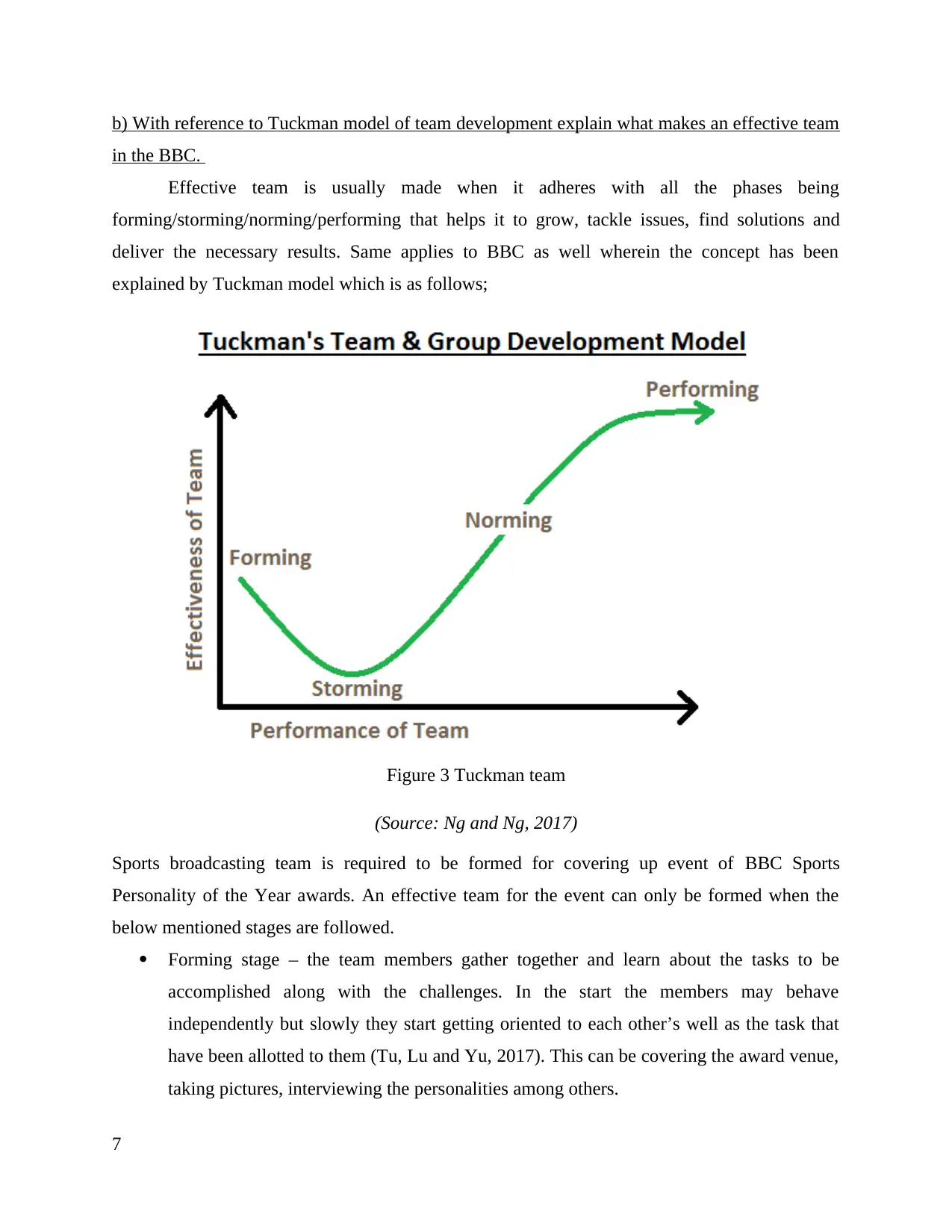
b) With reference to Tuckman model of team development explain what makes an effective team
in the BBC.
Effective team is usually made when it adheres with all the phases being
forming/storming/norming/performing that helps it to grow, tackle issues, find solutions and
deliver the necessary results. Same applies to BBC as well wherein the concept has been
explained by Tuckman model which is as follows;
Figure 3 Tuckman team
(Source: Ng and Ng, 2017)
Sports broadcasting team is required to be formed for covering up event of BBC Sports
Personality of the Year awards. An effective team for the event can only be formed when the
below mentioned stages are followed.
Forming stage – the team members gather together and learn about the tasks to be
accomplished along with the challenges. In the start the members may behave
independently but slowly they start getting oriented to each other’s well as the task that
have been allotted to them (Tu, Lu and Yu, 2017). This can be covering the award venue,
taking pictures, interviewing the personalities among others.
7
in the BBC.
Effective team is usually made when it adheres with all the phases being
forming/storming/norming/performing that helps it to grow, tackle issues, find solutions and
deliver the necessary results. Same applies to BBC as well wherein the concept has been
explained by Tuckman model which is as follows;
Figure 3 Tuckman team
(Source: Ng and Ng, 2017)
Sports broadcasting team is required to be formed for covering up event of BBC Sports
Personality of the Year awards. An effective team for the event can only be formed when the
below mentioned stages are followed.
Forming stage – the team members gather together and learn about the tasks to be
accomplished along with the challenges. In the start the members may behave
independently but slowly they start getting oriented to each other’s well as the task that
have been allotted to them (Tu, Lu and Yu, 2017). This can be covering the award venue,
taking pictures, interviewing the personalities among others.
7
Paraphrase This Document
Need a fresh take? Get an instant paraphrase of this document with our AI Paraphraser
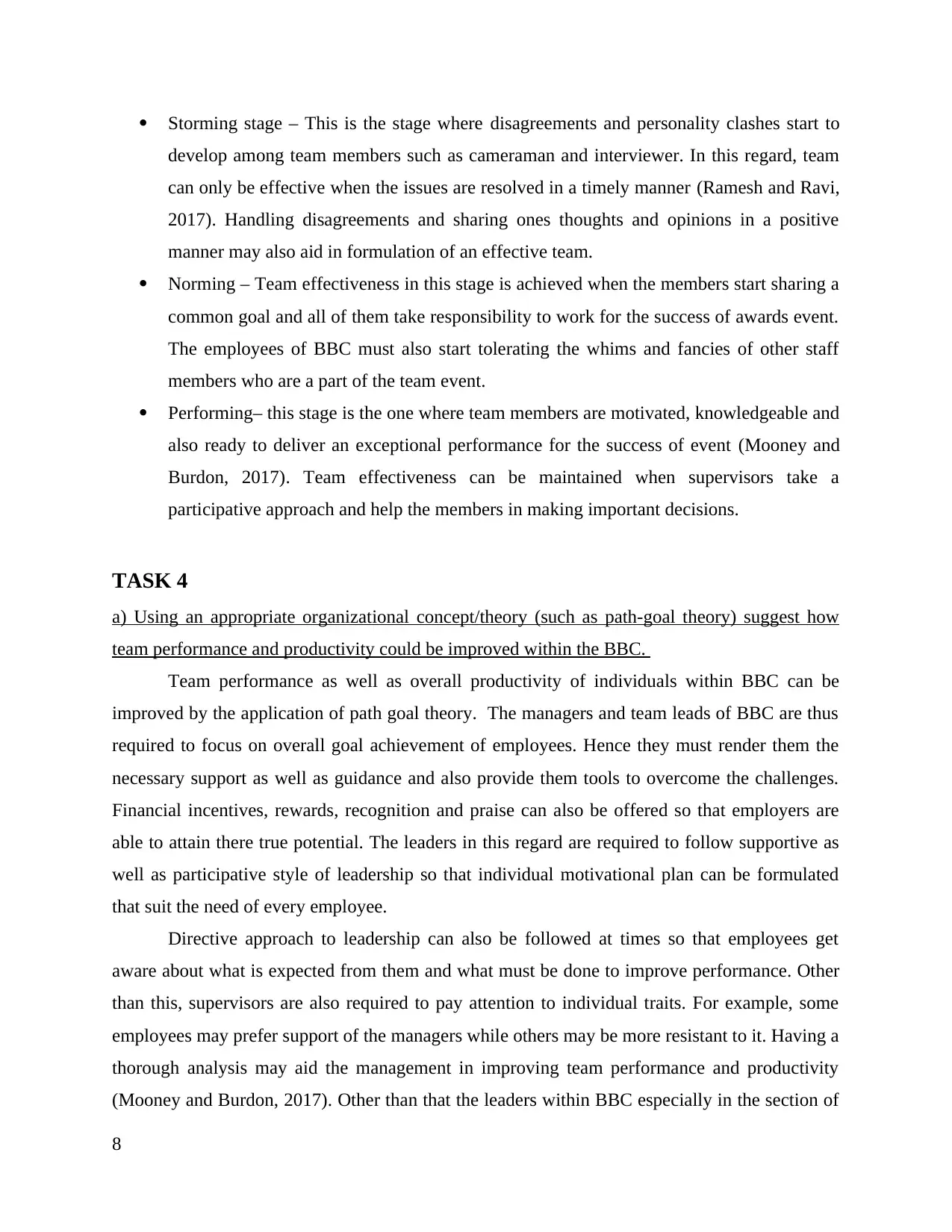
Storming stage – This is the stage where disagreements and personality clashes start to
develop among team members such as cameraman and interviewer. In this regard, team
can only be effective when the issues are resolved in a timely manner (Ramesh and Ravi,
2017). Handling disagreements and sharing ones thoughts and opinions in a positive
manner may also aid in formulation of an effective team.
Norming – Team effectiveness in this stage is achieved when the members start sharing a
common goal and all of them take responsibility to work for the success of awards event.
The employees of BBC must also start tolerating the whims and fancies of other staff
members who are a part of the team event.
Performing– this stage is the one where team members are motivated, knowledgeable and
also ready to deliver an exceptional performance for the success of event (Mooney and
Burdon, 2017). Team effectiveness can be maintained when supervisors take a
participative approach and help the members in making important decisions.
TASK 4
a) Using an appropriate organizational concept/theory (such as path-goal theory) suggest how
team performance and productivity could be improved within the BBC.
Team performance as well as overall productivity of individuals within BBC can be
improved by the application of path goal theory. The managers and team leads of BBC are thus
required to focus on overall goal achievement of employees. Hence they must render them the
necessary support as well as guidance and also provide them tools to overcome the challenges.
Financial incentives, rewards, recognition and praise can also be offered so that employers are
able to attain there true potential. The leaders in this regard are required to follow supportive as
well as participative style of leadership so that individual motivational plan can be formulated
that suit the need of every employee.
Directive approach to leadership can also be followed at times so that employees get
aware about what is expected from them and what must be done to improve performance. Other
than this, supervisors are also required to pay attention to individual traits. For example, some
employees may prefer support of the managers while others may be more resistant to it. Having a
thorough analysis may aid the management in improving team performance and productivity
(Mooney and Burdon, 2017). Other than that the leaders within BBC especially in the section of
8
develop among team members such as cameraman and interviewer. In this regard, team
can only be effective when the issues are resolved in a timely manner (Ramesh and Ravi,
2017). Handling disagreements and sharing ones thoughts and opinions in a positive
manner may also aid in formulation of an effective team.
Norming – Team effectiveness in this stage is achieved when the members start sharing a
common goal and all of them take responsibility to work for the success of awards event.
The employees of BBC must also start tolerating the whims and fancies of other staff
members who are a part of the team event.
Performing– this stage is the one where team members are motivated, knowledgeable and
also ready to deliver an exceptional performance for the success of event (Mooney and
Burdon, 2017). Team effectiveness can be maintained when supervisors take a
participative approach and help the members in making important decisions.
TASK 4
a) Using an appropriate organizational concept/theory (such as path-goal theory) suggest how
team performance and productivity could be improved within the BBC.
Team performance as well as overall productivity of individuals within BBC can be
improved by the application of path goal theory. The managers and team leads of BBC are thus
required to focus on overall goal achievement of employees. Hence they must render them the
necessary support as well as guidance and also provide them tools to overcome the challenges.
Financial incentives, rewards, recognition and praise can also be offered so that employers are
able to attain there true potential. The leaders in this regard are required to follow supportive as
well as participative style of leadership so that individual motivational plan can be formulated
that suit the need of every employee.
Directive approach to leadership can also be followed at times so that employees get
aware about what is expected from them and what must be done to improve performance. Other
than this, supervisors are also required to pay attention to individual traits. For example, some
employees may prefer support of the managers while others may be more resistant to it. Having a
thorough analysis may aid the management in improving team performance and productivity
(Mooney and Burdon, 2017). Other than that the leaders within BBC especially in the section of
8
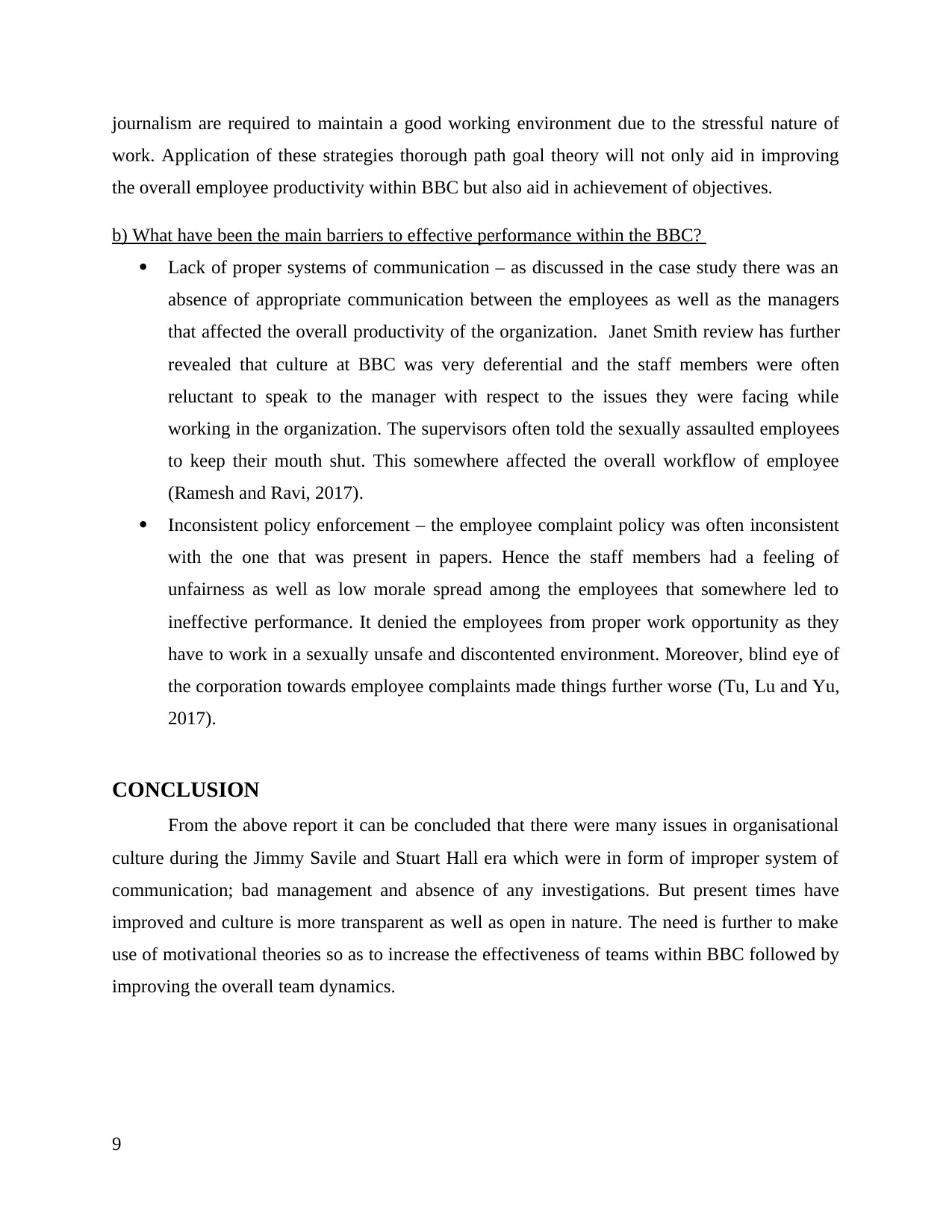
journalism are required to maintain a good working environment due to the stressful nature of
work. Application of these strategies thorough path goal theory will not only aid in improving
the overall employee productivity within BBC but also aid in achievement of objectives.
b) What have been the main barriers to effective performance within the BBC?
Lack of proper systems of communication – as discussed in the case study there was an
absence of appropriate communication between the employees as well as the managers
that affected the overall productivity of the organization. Janet Smith review has further
revealed that culture at BBC was very deferential and the staff members were often
reluctant to speak to the manager with respect to the issues they were facing while
working in the organization. The supervisors often told the sexually assaulted employees
to keep their mouth shut. This somewhere affected the overall workflow of employee
(Ramesh and Ravi, 2017).
Inconsistent policy enforcement – the employee complaint policy was often inconsistent
with the one that was present in papers. Hence the staff members had a feeling of
unfairness as well as low morale spread among the employees that somewhere led to
ineffective performance. It denied the employees from proper work opportunity as they
have to work in a sexually unsafe and discontented environment. Moreover, blind eye of
the corporation towards employee complaints made things further worse (Tu, Lu and Yu,
2017).
CONCLUSION
From the above report it can be concluded that there were many issues in organisational
culture during the Jimmy Savile and Stuart Hall era which were in form of improper system of
communication; bad management and absence of any investigations. But present times have
improved and culture is more transparent as well as open in nature. The need is further to make
use of motivational theories so as to increase the effectiveness of teams within BBC followed by
improving the overall team dynamics.
9
work. Application of these strategies thorough path goal theory will not only aid in improving
the overall employee productivity within BBC but also aid in achievement of objectives.
b) What have been the main barriers to effective performance within the BBC?
Lack of proper systems of communication – as discussed in the case study there was an
absence of appropriate communication between the employees as well as the managers
that affected the overall productivity of the organization. Janet Smith review has further
revealed that culture at BBC was very deferential and the staff members were often
reluctant to speak to the manager with respect to the issues they were facing while
working in the organization. The supervisors often told the sexually assaulted employees
to keep their mouth shut. This somewhere affected the overall workflow of employee
(Ramesh and Ravi, 2017).
Inconsistent policy enforcement – the employee complaint policy was often inconsistent
with the one that was present in papers. Hence the staff members had a feeling of
unfairness as well as low morale spread among the employees that somewhere led to
ineffective performance. It denied the employees from proper work opportunity as they
have to work in a sexually unsafe and discontented environment. Moreover, blind eye of
the corporation towards employee complaints made things further worse (Tu, Lu and Yu,
2017).
CONCLUSION
From the above report it can be concluded that there were many issues in organisational
culture during the Jimmy Savile and Stuart Hall era which were in form of improper system of
communication; bad management and absence of any investigations. But present times have
improved and culture is more transparent as well as open in nature. The need is further to make
use of motivational theories so as to increase the effectiveness of teams within BBC followed by
improving the overall team dynamics.
9
⊘ This is a preview!⊘
Do you want full access?
Subscribe today to unlock all pages.

Trusted by 1+ million students worldwide
1 out of 14
Related Documents
Your All-in-One AI-Powered Toolkit for Academic Success.
+13062052269
info@desklib.com
Available 24*7 on WhatsApp / Email
![[object Object]](/_next/static/media/star-bottom.7253800d.svg)
Unlock your academic potential
Copyright © 2020–2026 A2Z Services. All Rights Reserved. Developed and managed by ZUCOL.





